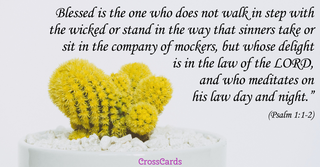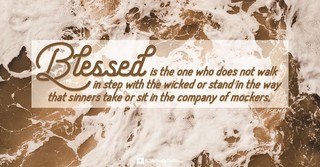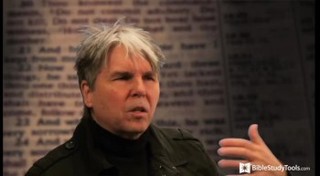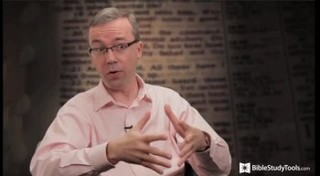
- Recent Translations
- All Translations
Psalm 1
Share
Settings
Psalm 1
1 The truly happy person doesn't follow wicked advice, doesn't stand on the road of sinners, and doesn't sit with the disrespectful.Videos for Psalm 1
Psalm 1 Commentary
Chapter 1
David was the penman of most of the psalms, but some evidently were composed by other writers, and the writers of some are doubtful. But all were written by the inspiration of the Holy Ghost; and no part of the Old Testament is more frequently quoted or referred to in the New. Every psalm either points directly to Christ, in his person, his character, and offices; or may lead the believer's thoughts to Him. And the psalms are the language of the believer's heart, whether mourning for sin, thirsting after God, or rejoicing in Him. Whether burdened with affliction, struggling with temptation, or triumphing in the hope or enjoyment of deliverance; whether admiring the Divine perfections, thanking God for his mercies, mediating on his truths, or delighting in his service; they form a Divinely appointed standard of experience, by which we may judge ourselves. Their value, in this view, is very great, and the use of them will increase with the growth of the power of true religion in the heart. By the psalmist's expressions, the Spirit helps us to pray. If we make the psalms familiar to us, whatever we have to ask at the throne of grace, by way of confession, petition, or thanksgiving, we may be assisted from thence. Whatever devout affection is working in us, holy desire or hope, sorrow or joy, we may here find words to clothe it; sound speech which cannot be condemned. In the language of this Divine book, the prayers and praises of the church have been offered up to the throne of grace from age to age.
The holiness and happiness of a godly man. (1-3) The sinfulness and misery of a wicked man, The ground and reason of both. (4-6)
Verses 1-3 To meditate in God's word, is to discourse with ourselves concerning the great things contained in it, with close application of mind and fixedness of thought. We must have constant regard to the word of God, as the rule of our actions, and the spring of our comforts; and have it in our thoughts night and day. For this purpose no time is amiss.
Verses 4-6 The ungodly are the reverse of the righteous, both in character and condition. The ungodly are not so, ver. 4; they are led by the counsel of the wicked, in the way of sinners, to the seat of the scornful; they have no delight in the law of God; they bring forth no fruit but what is evil. The righteous are like useful, fruitful trees: the ungodly are like the chaff which the wind drives away: the dust which the owner of the floor desires to have driven away, as not being of any use. They are of no worth in God's account, how highly soever they may value themselves. They are easily driven to and fro by every wind of temptation. The chaff may be, for a while, among the wheat, but He is coming, whose fan is in his hand, and who will thoroughly purge his floor. Those that, by their own sin and folly, make themselves as chaff, will be found so before the whirlwind and fire of Divine wrath. The doom of the ungodly is fixed, but whenever the sinner becomes sensible of this guilt and misery, he may be admitted into the company of the righteous by Christ the living way, and become in Christ a new creature. He has new desires, new pleasures, hopes, fears, sorrows, companions, and employments. His thoughts, words, and actions are changed. He enters on a new state, and bears a new character. Behold, all things are become new by Divine grace, which changes his soul into the image of the Redeemer. How different the character and end of the ungodly!
Psalm 1 Commentaries
Chapter Summary
INTRODUCTION TO PSALMS
The title of this book may be rendered "the Book of Praises", or "Hymns"; the psalm which our Lord sung at the passover is called an "hymn", Mt 26:30; and the one hundred forty fifth Psalm is entitled hlht, "an Hymn of David"; and the psalms in general are called "hymns" by Philo the Jew {a}, and songs and hymns by Josephus {b}; and to these several names of this book the apostle manifestly refers in Eph 5:19 Col 3:16. The Jews divided the writings of the Old Testament into three parts: the first division is the Law, or five books of Moses; the second is the Prophets, former and latter; and the third, the "Hagiographa", or holy writings; to which division Christ has a regard in Lu 24:44; and because the book of Psalms stand first in the last division, the whole goes by its name. This book by the Apostle Peter is entitled as here, Ac 1:20; the title in the Syriac version is,
``the Book of the Psalms of David, King and Prophet,''
with which agrees the Arabic version. As to the divine authority of it, that it was written by inspiration of God, we have not only the testimony of David, who says, "the Spirit of God spake by me", 2Sa 23:2; but the testimonies of Christ and his apostles, \Mt 22:43 Ac 1:16 4:24,25\; and, as Aben Ezra {c} observes the whole of it was spoken vdwqh xwrb, "by the Holy Ghost". Concerning the penman or amanuensis, employed by the Spirit of God in writing it, there are different opinions. The Jews make mention of ten, which are differently reckoned by them. According to Jarchi {d}, they were Adam, Melchizedek, Abraham, Moses, David, Solomon, Asaph, and the three sons of Korah. According to Kimchi {e}, they were Adam, the first, Melchizedek, Abraham, Asaph, Heman, Jeduthun, Moses, and the three sons of Korah; Asir, Elkanah, and Abiasaph. Some ascribe all the Psalms to David {f}, and think that those which are said to be a psalm of Asaph, or of Heman should be rendered "a psalm to Asaph", &c. and only signify that they were psalms delivered to them, to be sung in a public manner. But the truest opinion seems to be, that the greater part of them were written by David, and for the most part those that have no title; and the rest by those whose names they bear. Some were written at and after the Babylonish captivity, as Ps 126:1-6 and Ps 137:1-9. The manner or form in which they were written was metre {g}, though some deny it that the Jews had metre: as appears by the different accentuation of them from other writings, and from their being sung vocally and on musical instruments. Josephus {h}, the Jewish historian, says, that
``David being free from war, and enjoying a profound peace, composed songs and hymns to God, of various metre; some trimeter, and some pentameter;''
that is, some of three feet, and others of five feet: for the Psalms of David are thought to be of the "lyric" kind; and Gomarus, in his Lyra, has given many instances out of them, which are of the "iambic", "trochaic" kind though the Jews for many years have lost the knowledge of the sacred poetry. R. Benjamin {i} indeed says, that in his time there were at Bagdad R. Eleazar and his brethren, who knew how to sing the songs, as the singers did when the temple was standing. The subject matter of this book is exceeding great and excellent; many of the psalms respect the person, offices, and grace of Christ; his sufferings and death, resurrection, ascension, and session at the right hand of God; and so are exceeding suitable to the Gospel dispensation. The whole book is a rich mine of grace and evangelical truths, and a large fund of spiritual experience; and is abundantly suited to every case, state, and condition, that the church of Christ, or particular believers, are in at any time.
{a} De Mutat. Nom. p. 1062. {b} Antiquitat. l. 7. c. 12. s. 3. {c} Praefat. in Psalm. {d} Praefat. in Psalm. {e} Praefat. in ibid. {f} R. Hona in Midrash Tillim, fol. 2. 1. {g} Vid. Lowth de Sacr. Poes. Heb. Praelect. 3. s. 32 {h} Ut supra. (Antiquitat. l. 7. c. 12. s. 3.) {i} Itinerar. p. 70, 71.
\\INTRODUCTION TO PSALM 1\\
This psalm, though without a title, may reasonably be thought to be a psalm of David; since the next psalm, which is also without a title, is ascribed to him, Ac 4:25; and since both are joined together as one psalm by the Jews {k}; \\see Gill on "Ac 13:33"\\; and since this is the general preface to the whole book, which is chiefly of David's penning, it is entitled, in the metaphrase of Apollinarius,
``a Song of David, the Prophet and King.''
{k} T. Bab. Beracot, fol. 9. 2.



